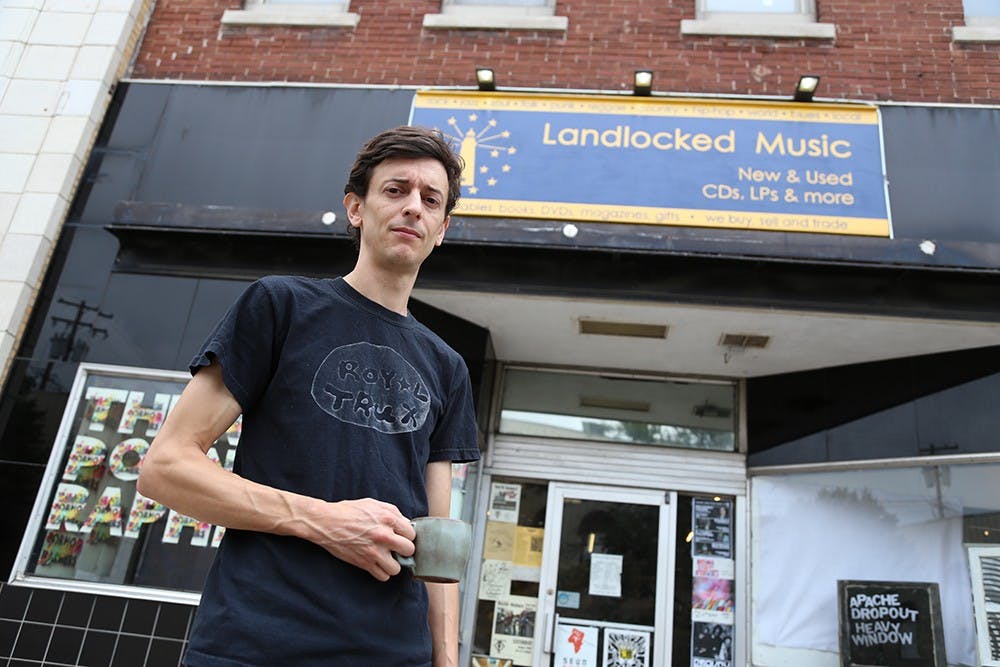Thirty-three percent.
According to Nielsen and Billboard, that’s how much the sales of vinyls and LPs grew in between 2012 and 2013.
While the sales of vinyl and LPs still make up a relatively tiny portion of all music sales in the United States — roughly six percent — that is still a substantial amount of growth.
One Bloomington record shop is contributing to that figure.
In March of 2006, Jason Nickey and fellow IU alumnus Heath Byers opened Landlocked Music, located just off of the square in downtown Bloomington on Walnut Street.
“We just wanted there to be a good record store in the town that we lived in, so we took it upon ourselves to do it,” Nickey said. “There wasn’t a store that we thought was up to our standards.”
Records were always a part of Nickey’s life. His dad kept records around the house, and even though Nickey was a kid during the 1980s, much of the music he grew up on was the music on his dad’s records — music from bands like the Who and Led Zeppelin.
Many of the records Nickey had collected until 2006, along with those of Byers and their friends, comprised the original inventory Landlocked sold to customers.
That inventory, though, has substantially grown since then.
“We had more bins than we had records to put in them,” Nickey said.
A hub for music
Purchasing goods and services from a local business brings money back into a local economy in a way that buying from national chains just can’t do, according to President and CEO of the Greater Bloomington Chamber of Commerce Jeb Conrad.
“When the choice is right and makes sense — the individuals or the business — they should consider purchasing locally first,” Conrad said.
Dan Coleman is a concert promoter who works through his company, Spirit of ’68 Promotions, which brings bands to local Bloomington venues.
Along with being a customer, Coleman does business with Landlocked. The store serves as an outlet for tickets to shows he’s promoting at various local establishments as well as giving space to advertise for those shows.
“They’re a central hub for people to find out about what music is going on in town if you can’t walk through campus and maybe see a flier,” Coleman said.
Landlocked is a place customers can come to and see when a certain band is coming to town and buy that band’s album at the same time, all in the same place, Coleman said.
Facilitating discovery
Landlocked Music doesn’t work in the same way that iTunes or even Best Buy does, but that’s not a problem because it’s not necessarily trying to.
Nickey and the staff at Landlocked work closely with customers to figure out what it is they’ll enjoy listening to.
“Everyone’s sort of locked in to what they already like. They’ve been sort of pigeonholed. And I’m trying to, like, sort of break out of that,” Nickey said.
Sometimes, the staff accomplishes that goal by asking what the customer likes and going off of that — other times, it’s just by playing music in the store the customers may have not heard yet.
“Many times I’ve walked in and just heard a record and bought it on the spot,” Coleman said.
Other times, Nickey leaves it to the store that he curates in its purposeful randomness to steer the customer to uncharted territories.
“It’s those accidental discoveries — you pick up a record, and it’s something that strikes your imagination, and you might not know anything about it,” Nickey said.
Another way Landlocked differentiates itself from online music stores is in its close relationship with customers.
Nickey says he’s been selling records to some customers since 1995.
“I know when I order records sometimes exactly who’s going to buy them,” Nickey said. “Like the name, the person — I can almost just put it aside for them.”
Even though physical media sales may be on the decline — 13 percent from 2012 to 2013, according to Nielsen and Billboard — Landlocked and local record stores in general will be able to do some things that their Goliath-sized competitors won’t.
“I’m trying to create a place for discovery that isn’t so deterministic, that has a little bit more mystery to it,” Nickey said.




